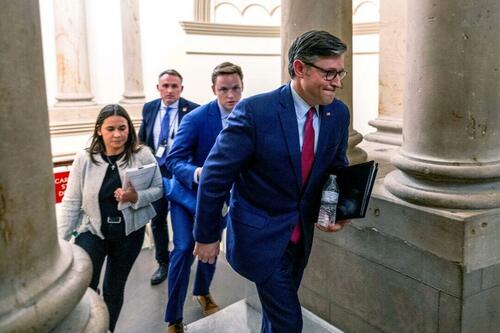
Authored by Joseph Lord, Stacy Robinson and Jackson Richman via The Epoch Times (emphasis ours),
The House on Sept. 18 failed to pass a temporary spending fix that would have forestalled a government shutdown.
The GOP measure, which would have extended the government funding deadline by six months, was rejected by the House in a 202–220 vote, including 14 Republicans who voted against it. Three Democrats supported the bill. Two members voted “present.”

Aside from punting the funding deadline from Sept. 30 to March 2025, a measure known as a continuing resolution, the bill included the Safeguard American Voter Eligibility (SAVE) Act, which would have required proof of citizenship to register to vote.
Democrats overwhelmingly opposed the plan and have called instead for a three-month stopgap bill with no policy riders, known as a “clean” continuing resolution. They rejected the SAVE Act, arguing it’s an unnecessary measure because existing laws already bar noncitizens from voting.
Republican objections to the spending plan came from various camps. Some Republicans object to the use of continuing resolutions; others believe that the spending figures were too high; and some say a six-month stopgap would leave the military underfunded for too long.
With the bill’s failure, House Republican leaders will go back to the drawing board with 12 days left until government funding runs dry. Several Republican members told The Epoch Times that they believe that leadership will ultimately adopt a clean continuing resolution with Democrats’ help.
No Republican Consensus
The vote on the legislation was originally slated for last week, but House Speaker Mike Johnson (R-La.) pulled it from the floor early on Sept. 11 after opposition from Republicans and Democrats alike. He said then that the bill was still in the “consensus-building” phase.
Rep. Thomas Massie (R-Ky.) has expressed opposition to continuing resolutions on principle, saying he wants Congress to pass the required 12 funding bills individually, rather than wrapping them into continuing resolutions or massive end-of-year omnibus spending bills.
“Whether Democrats are in control or Republicans are in control, we never do the 12 separate bills,” he said, referring to the dispute as “political theater.”
Although the inclusion of the SAVE Act was designed to make the measure more palatable to Republicans who would otherwise oppose it, many were critical of the move, describing it as a “show vote” that has no chance to either become law or be implemented before Election Day.
“I don’t know what’s changed over the weekend to think that you put this on the floor tomorrow, it’s going to pass,” Rep. Troy Nehls (R-Texas) told The Epoch Times the night before the vote.
Still, Nehls said there was some value in forcing Democrats to go on the record with a vote on the issue.
Rep. Byron Donalds (R-Fla.) told reporters ahead of the vote that he planned to support the legislation, arguing that it would be better to deal with funding under a new president.
“I firmly believe that you cannot find that compromise with this current White House. It should be left to the next president of the United States,” Donalds said.
Rep. Tom Cole (R-Okla.), chairman of the House Appropriations Committee, said the House has allocated more money for the Department of Veterans Affairs than what the Biden administration requested.
Cole said that the SAVE Act is crucial given the crisis at the southern border.
“I’m extraordinarily perplexed that the idea of reaffirming in a time of unmitigated disaster at the southern border that you’ve got to be an American citizen to vote in an election is somehow controversial,” he said.
Democrats Promised to Kill the Bill
Ahead of the vote, Rep. Rosa DeLauro (D-Conn.), ranking member of the House Appropriations Committee, noted that it is already illegal for noncitizens to vote in federal elections.
“This bill is an admission that the House Republican majority cannot govern,” she said.
DeLauro went on to claim that the bill “abandons our military, our Social Security recipients, and our cities and families who are grappling with disasters and no disaster relief.”
Even if the bill had passed the House, Senate Majority Leader Chuck Schumer (D-N.Y.) had indicated that he wouldn’t bring it to a vote in the upper chamber. Schumer described the SAVE Act as a “poison pill.”
“Democrats support a [continuing resolution] to keep the government open. As I have said before, the only way to get things done is in a bipartisan way,” he wrote in a “Dear Colleague” letter.
President Joe Biden had also promised to veto the bill.
The failure of the legislation brings leaders back to square one on funding the government. Of the 12 appropriations bills that need to be passed each year, the House has passed five, but none of these have been taken up in the Senate because of the inclusion of controversial culture war provisions.
The Senate has passed no funding bills to date.
Historically, when government funding comes due in September, lawmakers have punted the issue until the end of December before passing 1,000-plus page omnibus spending legislation with the support of most Democrats and some Republicans.
Authored by Joseph Lord, Stacy Robinson and Jackson Richman via The Epoch Times (emphasis ours),
The House on Sept. 18 failed to pass a temporary spending fix that would have forestalled a government shutdown.
The GOP measure, which would have extended the government funding deadline by six months, was rejected by the House in a 202–220 vote, including 14 Republicans who voted against it. Three Democrats supported the bill. Two members voted “present.”

Aside from punting the funding deadline from Sept. 30 to March 2025, a measure known as a continuing resolution, the bill included the Safeguard American Voter Eligibility (SAVE) Act, which would have required proof of citizenship to register to vote.
Democrats overwhelmingly opposed the plan and have called instead for a three-month stopgap bill with no policy riders, known as a “clean” continuing resolution. They rejected the SAVE Act, arguing it’s an unnecessary measure because existing laws already bar noncitizens from voting.
Republican objections to the spending plan came from various camps. Some Republicans object to the use of continuing resolutions; others believe that the spending figures were too high; and some say a six-month stopgap would leave the military underfunded for too long.
With the bill’s failure, House Republican leaders will go back to the drawing board with 12 days left until government funding runs dry. Several Republican members told The Epoch Times that they believe that leadership will ultimately adopt a clean continuing resolution with Democrats’ help.
No Republican Consensus
The vote on the legislation was originally slated for last week, but House Speaker Mike Johnson (R-La.) pulled it from the floor early on Sept. 11 after opposition from Republicans and Democrats alike. He said then that the bill was still in the “consensus-building” phase.
Rep. Thomas Massie (R-Ky.) has expressed opposition to continuing resolutions on principle, saying he wants Congress to pass the required 12 funding bills individually, rather than wrapping them into continuing resolutions or massive end-of-year omnibus spending bills.
“Whether Democrats are in control or Republicans are in control, we never do the 12 separate bills,” he said, referring to the dispute as “political theater.”
Although the inclusion of the SAVE Act was designed to make the measure more palatable to Republicans who would otherwise oppose it, many were critical of the move, describing it as a “show vote” that has no chance to either become law or be implemented before Election Day.
“I don’t know what’s changed over the weekend to think that you put this on the floor tomorrow, it’s going to pass,” Rep. Troy Nehls (R-Texas) told The Epoch Times the night before the vote.
Still, Nehls said there was some value in forcing Democrats to go on the record with a vote on the issue.
Rep. Byron Donalds (R-Fla.) told reporters ahead of the vote that he planned to support the legislation, arguing that it would be better to deal with funding under a new president.
“I firmly believe that you cannot find that compromise with this current White House. It should be left to the next president of the United States,” Donalds said.
Rep. Tom Cole (R-Okla.), chairman of the House Appropriations Committee, said the House has allocated more money for the Department of Veterans Affairs than what the Biden administration requested.
Cole said that the SAVE Act is crucial given the crisis at the southern border.
“I’m extraordinarily perplexed that the idea of reaffirming in a time of unmitigated disaster at the southern border that you’ve got to be an American citizen to vote in an election is somehow controversial,” he said.
Democrats Promised to Kill the Bill
Ahead of the vote, Rep. Rosa DeLauro (D-Conn.), ranking member of the House Appropriations Committee, noted that it is already illegal for noncitizens to vote in federal elections.
“This bill is an admission that the House Republican majority cannot govern,” she said.
DeLauro went on to claim that the bill “abandons our military, our Social Security recipients, and our cities and families who are grappling with disasters and no disaster relief.”
Even if the bill had passed the House, Senate Majority Leader Chuck Schumer (D-N.Y.) had indicated that he wouldn’t bring it to a vote in the upper chamber. Schumer described the SAVE Act as a “poison pill.”
“Democrats support a [continuing resolution] to keep the government open. As I have said before, the only way to get things done is in a bipartisan way,” he wrote in a “Dear Colleague” letter.
President Joe Biden had also promised to veto the bill.
The failure of the legislation brings leaders back to square one on funding the government. Of the 12 appropriations bills that need to be passed each year, the House has passed five, but none of these have been taken up in the Senate because of the inclusion of controversial culture war provisions.
The Senate has passed no funding bills to date.
Historically, when government funding comes due in September, lawmakers have punted the issue until the end of December before passing 1,000-plus page omnibus spending legislation with the support of most Democrats and some Republicans.
Loading…





